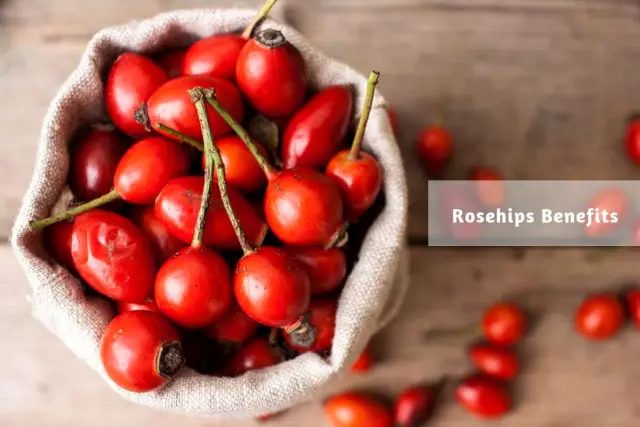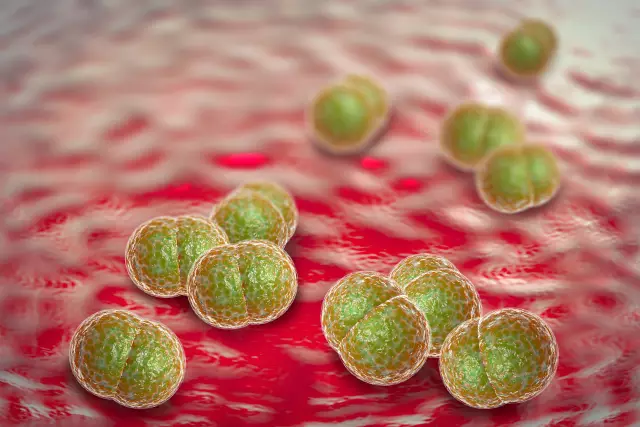- Author Rachel Wainwright [email protected].
- Public 2023-12-15 07:39.
- Last modified 2025-11-02 20:14.
We are treated with rose hips: 7 remedies and their application
Rosehip is one of the most common ornamental and medicinal plants. It grows practically throughout the entire territory of our country. Most Russians know this beautiful shrub primarily as a source of fruits that are extremely rich in vitamins. However, the healing properties of rose hips are by no means limited to the named ones. How else you can use the plant for medicinal purposes, we will tell you today.

Source: depositphotos.com
Decoction and infusion of roots
In addition to vitamins and trace elements, rosehip root contains a large amount of tannins. It can be used as a mild diuretic and choleretic agent, as well as a natural antiseptic.
To prepare a decoction of roots, 50 g of well-crushed raw materials are poured into 300 ml of hot water and boiled over low heat for 10-15 minutes, then filtered, and the container with the resulting liquid is kept for 7-8 hours in a dark place, having previously wrapped. This tea is considered a very effective remedy for gallstone and urolithiasis. It is also used in the treatment of anorexia. The broth should be drunk 3 times a day, 50 ml 20 minutes before meals.
Rosehip root infusion is prepared from 1 tablespoon of raw materials and 400 ml of boiling water. The mixture is boiled for 15 minutes, insisted for 2 hours, filtered and taken in half a glass before meals 3-4 times a day. The remedy helps with liver and kidney diseases, cystitis, fever, arterial hypertension, heart disease, and digestive disorders accompanied by diarrhea. In addition, compresses and baths with rosehip root infusion relieve pain and reduce inflammation in gout, rheumatism, radiculitis and muscle pain.
Decoction of branches
Young shoots of rose hips can be included in vegetable salads as a vitamin supplement. The bark of lignified branches is used in folk medicine as an emetic.
Decoctions of the stems and branches of the plant alleviate the condition of patients with malaria, relieve fever and other unpleasant symptoms with colds, reduce discomfort with menstrual pain, and increase hemoglobin levels with anemia.
Alcoholic fruit tincture
Rosehip tincture has a tonic, bactericidal, immunostimulating effect, improves blood composition. It is recommended to take it for anemia, hematopoiesis disorders, pathologies of the gastrointestinal tract and the genitourinary system, internal and external bleeding, fractures and wounds, infectious diseases and any ailments that last for a long time, weakening the body.
To prepare the drug, take 5 tablespoons of fruits, 400 ml of vodka and 600 ml of boiled water. The raw materials are crushed, mixed with water and vodka in a glass container, and the resulting liquid is kept tightly closed in a dark cool place for 3-4 weeks. The strained infusion can be stored in the refrigerator. The remedy should be taken before meals 2-3 times a day, 30-40 drops. The course of treatment is 1.5-2 months.
You can also prepare an infusion of rosehip berries in 70% alcohol. Then the fruits are not crushed, but steamed for several minutes in boiling water, then the raw materials are mixed with alcohol (1 glass of berries per 250 ml) and 5-7 tablespoons of granulated sugar, topped up with 1 liter of boiled water and kept for a month in a cool place, shaking occasionally. The dosage and regimen of administration are usually selected individually.
Water infusion of petals
Rosehip flower petals, possessing a wonderful aroma, have long been used to prepare the well-known perfumery and cosmetic product - rose water. It perfectly tones skin, especially sensitive or prone to inflammation. Rose water is very useful for aging skin that is deficient in moisture and nutrients.
To prepare the infusion, 2 tablespoons of raw materials are poured with 1 glass of boiling water and kept for 30 minutes, wrapped tightly. The strained solution can be kept in the refrigerator for a while, used as needed for facials, or frozen in ice cube trays. Daily rubbing with ice cubes on the face, neck and décolleté is a good substitute for washing. Cubes made from infusion of rosehip petals in mineral water are no less useful cosmetic product.
Rose water has another healing property: compresses with it perfectly relieve swelling on the face and reduce eye fatigue after a hard day, constant work at the computer or long reading.
Tea made from leaves, flowers and fruits
Vitamin tea can be made from a mixture of rosehip leaves, fruits and flowers, as well as from each of the ingredients separately. Rosehip tea is the most popular. They are steamed in boiling water or insisted in a thermos. It turns out a pleasant refreshing drink rich in vitamins and microelements. It is used for anemia, loss of strength, vitamin deficiency. Doctors advise daily drinking rosehip tea to patients who have recently had severe infectious diseases, inflammation and trauma.
Vitamin tea is extremely beneficial for children as well. It can be given little by little to babies at the age of 3-4 months.

Source: depositphotos.com
Rosehip oil
Rosehip oil is produced from the seeds and flowers of the plant. This can be done at home, but the process is quite laborious. Most people use a pharmacy drug.
Rosehip oil is taken orally for diseases of the kidneys, liver and gastrointestinal tract, anemia, pulmonary tuberculosis, anemia and many other ailments. It has a pronounced antiseptic and wound healing effect. Outwardly, the drug is used to treat lesions of the skin and mucous membranes, trophic ulcers, bedsores.
In cosmetology, oil is used to rejuvenate and regenerate the skin, normalize the work of sweat and sebaceous glands, eliminate rosacea (mixed with aloe juice), and improve complexion.
Rosehip syrup
This is a popular dosage form that is prescribed for general loss of strength, anemia, vitamin deficiency, as well as in the recovery period after severe illness. The preparation contains an aqueous extract of rose hips, ascorbic acid and sugar.
You can make your own rosehip syrup if you wish. To do this, it is enough to squeeze the juice from the berries (or make a saturated aqueous infusion), boil it with sugar, adding citric acid as a preservative, and pour it into pre-prepared (sterilized) jars. After capping and cooling completely, the product is stored in the refrigerator and used to prepare vitamin drinks.
Like many other herbal preparations, remedies made from rosehip have contraindications. They should not be taken with hypotension, increased blood clotting, and a tendency to allergic reactions. Syrups containing sugar are not recommended for diabetics, and alcoholic tinctures are not recommended for pregnant women, nursing mothers and children.
All rosehip preparations are extremely effective, but it should be borne in mind: in the presence of severe chronic diseases, their use must be agreed with the attending physician.
YouTube video related to the article:

Maria Kulkes Medical journalist About the author
Education: First Moscow State Medical University named after I. M. Sechenov, specialty "General Medicine".
Found a mistake in the text? Select it and press Ctrl + Enter.






